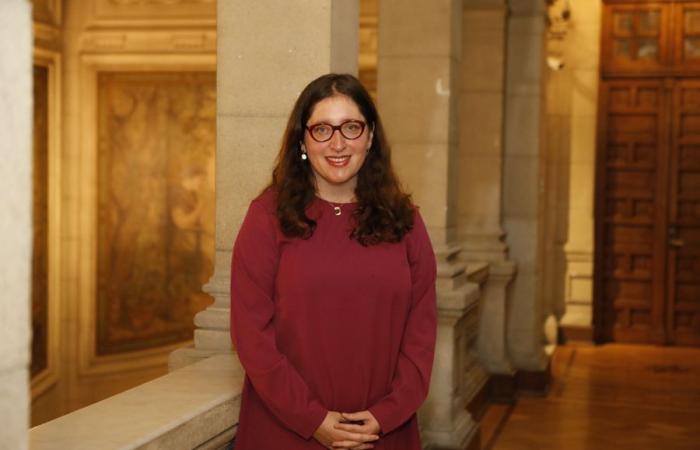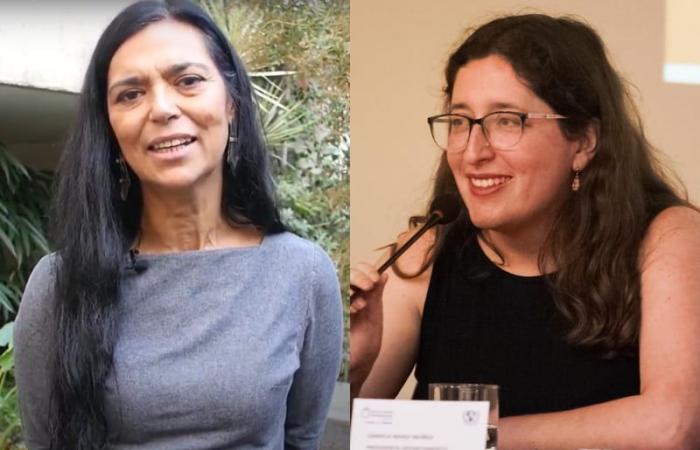At 11:00 a.m. this Thursday, an extraordinary plenary session was scheduled at the Constitutional Court (TC) to elect who will succeed the current president of the organization, Nancy Yanez. After three votes, the majority of the ten members of the Huérfanos 1234 headquarters were inclined to elect Daniela Marzi as the new minister who will head the institution.
The choice of the labor law expert – who had six votes over the minister’s four Miguel Ángel Fernández- It not only has implications within the court, but also in political matters, since Marzi’s appointment means that the government maintains control of the presidency of the organizationafter the departure of the person who currently heads it, Minister Yáñez.
Both ministers were appointed together by the President Gabriel Boric in April 2022 to replace the ministers Iván Aróstica and Maria Luisa Brahm, who left the organization that year. And the importance of that position lies in the fact that It is the president who casts the deciding vote in the event of a tie in the court’s decisions.
This privilege is transcendental when there are constitutional controversies, which is even more relevant when these arise from the constitutionality control of Congressional bills or executive decisions, as occurred last year with the controversial pardons granted by Boric, which were declared constitutional by the Constitutional Court.
Although the summons to the extraordinary plenary session was set for 11:00 a.m., the call had to be repeated more than once in the morning, after after the first vote it was not possible to choose a name by the majority of the votes.
In both the first vote and the second, which was called for 1:00 p.m. due to the lack of agreement, the candidates for the presidency were Marzi, Fernandez and the minister Maria Pia Silva. In this way, the plenary session revealed the existence of three factions: the right-wing ministers who promoted Fernández, the centrist magistrates linked to the DC under the name of Silva and the left-wing ministers who supported Marzi.
On those two occasions, Fernandez had the majority with four votes: his own and that of the ministers close to the right José Ignacio Vásquez, Hector Mery and Marcela Peredo.
He was followed with three votes by Marzi, who in addition to having her own vote also had that of Yáñez and the minister. Catalina Lagos. In the case of Silva, in addition to his vote, he had the support of the ministers Raul Mera and Alejandra Precht.
However, and already in a third vote called for 1:30 p.m.Minister Marzi prevailed over Fernández by receiving the three votes of Minister Silva, who leaned towards the lawyer specializing in labor law. This implied that Minister Silva gave up her attempt to become president of the TC.
Marzi’s new term will take place after the end of the presidency of Yáñez, who, according to sources familiar with the process, did not consider running for re-election, despite the fact that the organic law of the court allowed him to do so. Thus, His term will end on July 12.
Despite this, sources of Third they comment that Marzi’s election is seen and valued as continuity of Yáñez, who is well evaluated within the organization. His main achievement, they commented in the plenary session, was to organize and discipline a TC that, in recent terms, had gone through strong polarization and an internal war unleashed between several ministers who have already finished their terms. That is why Yáñez is recognized as having improved internal climate.
The new president of the Constitutional Court is a lawyer from the University of Valparaíso, as well as a master’s degree holder in labor law from the University of Bologna and a doctor of law from the Autonomous University of Madrid.
It is precisely that specialty that Marzi highlighted once she was appointed by Boric in 2022. In an interview with RVL Radio, from the University of Valparaíso, she stated that “It wasn’t the most obvious bet” appointing a specialist in labor law, for the same reason he valued her because the TC also reviews these matters.
On that radio station, where she gave her first interview upon being appointed and where she was also a presenter, the future president stated in April 2022 that she had “a critical vision of what has happened in recent years with the TC, but it is an important institution that is functioning.” Along those lines, he added that she had been appointed along with Yáñez, so he hoped that “we can provide constitutional justice of a very good level and that she can play a better role than what she did until recently.”
At that time he also added that as ministers they were called to “Do not go overboard, do not overthrow policies with bad arguments.” Furthermore, at that time he stated that the Constitutional Court could play “a good role” in the constituent process that was being discussed that year, a period that he described as “intermediate” due to “the arrival of another institutionality.” Something that ultimately did not materialize due to the rejection of the constituent project and the maintenance of the institution that he will lead in the coming years.



